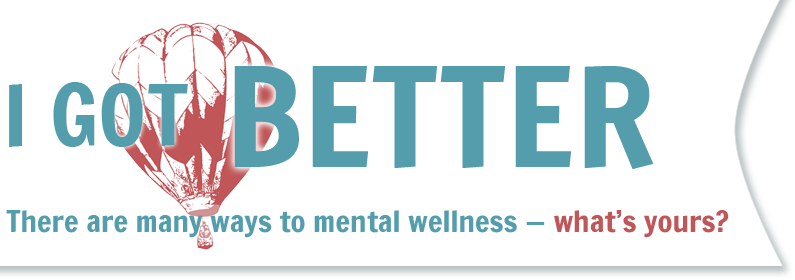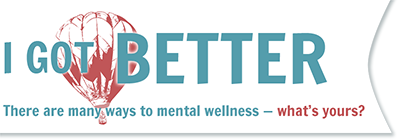I couldn’t adjust, and that’s OK
Amanda Jensen; North San Juan, CA

During your mental health care, have you often felt hopeless about your chance of getting better?
Yes. And while this might be more of an indictment against the system en masse: I started thinking of my normal, even if sometimes dramatic, travails as clinical features, and not human challenges. I was no longer sad, I was depressed. I was no longer understandably worried, I was experiencing anxiety. I’ll say the single worst injury done was that I adopted this dehumanizing and clinical worldview, and it changed me and how I related to others.
Has a mental health provider ever told you that you could reach a personal goal despite your psychiatric diagnosis (for example, education, career, independent housing, relationship, children, etc.)?
Yes. I had an excellent experience with a progressive social worker who really, really practiced harm reduction and encouraged and celebrated strengths. He also taught me some amazing coping skills (yoga, meditation) and dietary means of managing my symptoms (sweet potatoes, greens, fish!). He was one of dozens of professionals I’d been treated by, and the only one who was culturally capable to support me. I think I saw him 3 times, checked in via phone a few more times after that – and I was off (as it should be!), empowered, better equipped and living my life.
Has a mental health provider ever told you that you could not reach a personal goal because of your psychiatric diagnosis (for example, education, career, independent housing, relationship, children, etc.)?
Yes. Most of my treatment came from an inner city community health center and affiliated providers. If I mentioned goals, or ideas, I was usually cautioned to ‘take it easy,’ or to ‘not overdo it.’ So while there wasn’t a specific NO, there was definitely not a YES.
If you overcame hopelessness that you could get better from a mental health or emotional problem, was there a turning point for you?
Why, yes. It was February of 2006 and I was sitting in the waiting room of what would be my very last psychiatric visit ever. While sitting I glanced at the title of a Time magazine article, which read: “Happiness Isn’t Normal.” I read it, and decided there and then to accept that my mind will do what it will, and that I should lay out my values and goals and work toward them undeterred by my thoughts. I should no longer strive to be happy, since doing that only increased my misery and anxiety. I should, no matter what, remember that I am not my thoughts. Even if there is a war occurring behind my eyes, I can greet you with a soft voice and a warm hand, for you might be sheltering a private battle, too. A couple of years later I saw the most helpful social worker ever for a few sessions and have since been well enough to work, study (I have a 4.0 and made the Dean’s list in college!), and eventually find my way home.
Tell us what recovery means to you. How would you define recovery from mental health or emotional problems in your own words?
To me it is to be fully able to live honestly and productively within the contexts of my sub/counter-cultural values. This means I strive to engage peacefully with people (at home and beyond), I work to advance social justice (serving the homeless), I live as sustainably as possible (in an off-grid yurt in the Sierra). I eat healthy foods and feel SO super fortunate to have access to such health/life-giving food and herbs. Less than 7 years ago I was mired in a big city mental health system, obese, discouraged, nearly surrendered to a life of poor health and constant unrequited search for ‘happiness.’ Recovery, to me also means that I have severed harmful ties and that I consciously embrace nourishing ones. For me, I returned to my home community, where for so long I felt I had no place, but now see that every herd needs their black sheep. Or graying sheep. Whatever. I’m still weird.
If you could send a brief message to someone receiving mental health care today who is feeling hopeless about getting better, what would you say?
Friend: Immediately release any attachment to who you think others want or wanted you to be. Immediately identify and embrace who you are and who you want to be. This is how I began to get better. You can begin, too.
Can you give examples showing you have gotten better from a mental or emotional problem, such as how you are doing well or accomplishing goals you have chosen?
I am much more successful in caring for my overall emotional health and managing feelings of being overwhelmed or distressed. I find being purposefully engaged in meaningful activities (that align with my values) to be most helpful; it provides a framework for my life that makes sense to me and feels right. So, when I was experiencing my worst ‘symptoms,’ I was living in a manner completely inconsistent with my values. Today, I live in sustainable harmony on shared land in an off-grid yurt. I have nurturing and reciprocal relationships with the humans, animals and plants in my midst. I work in service to others professionally, in ways that are strictly supportive and empowering. I tell the truth, I eat local organic, often home grown food, I spend my time doing things that matter and resonate. I eschew mainstream media, consumerism, mainstream America. I’m ever mindful of what Krishnamurti said: “It is no measure of health to be well adjusted to a profoundly sick society.” Well, I couldn’t adjust, and that’s OK. I made my way, along well-tread paths and with friendly encouragement, to a place I could live and serve in peace.


